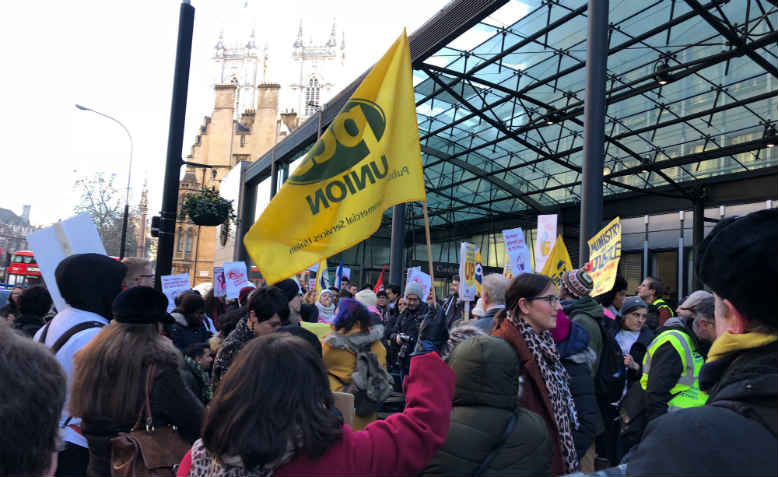 Joint PCS and UVW strike rally outside Department for BEIS, 22 January 2018. Photo: Shabbir Lakha
Joint PCS and UVW strike rally outside Department for BEIS, 22 January 2018. Photo: Shabbir Lakha
Despite the cold, picket lines outside the Ministry of Justice and Department for Business, Energy and Industrial Strategy were vibrant and defiant, reports Shabbir Lakha
Receptionists, security guards, cleaners at the Ministry of Justice represented by the UVW Union and support staff at the Department for Business, Energy and Industrial Strategy represented by the PCS union organised a joint two-day strike beginning 22 January, demanding a London Living Wage, an end to outsourcing and parity of sick pay and annual leave with civil servants.
Both picket lines were well attended, noisy and in high spirits despite the cold temperatures. At 9:30 am, strikers from the MoJ marched up to the BEIS to join PCS strikers for a joint rally. There was a big presence from Labour’s shadow cabinet and MPs which included John McDonnell, Laura Pidcock, Richard Burgon, Dan Carden, Rebecca Long-Bailey, Angela Rayner, Chris Williamson, Lloyd Russell-Moyle and Clive Lewis.
The strike action is a stark reminder that while Parliament is stuck at an impasse over Brexit, workers are struggling against the weight of austerity and the gig economy. The Tories have continually defended their policies by pointing at high employment rates, but as strikers have shown, the government itself pays staff working in its departments poverty wages and under increasingly precarious contracts.
Statistics from the Trussell Trust show that the number one reason for people relying on food banks, which continues to increase at an alarming rate, is low income. The slowest rate of wage growth in 200 years while the cost of living has continued to rise has meant working people have faced real term wage cuts for the last ten years. The public sector pay cap, insecure contracts and the clampdown on collective bargaining have accelerated the downward spiral. Add in the housing crisis, the colossal failure of universal credit, and the decimation of public services, and it’s then unsurprising to see the exponential growth in homelessness and food bank dependency.
The strike follows on from lecturers and fast food and delivery workers among others striking last year against pension cuts, poverty wages and precarity. It’s good to see smaller and non-TUC affiliated trade unions stepping up and taking decisive action, and working together with workers represented by bigger unions to increase impact, and achieving victories. The Glasgow Women Strikers recently won a settlement after their brilliant and militant strike against the gender pay gap.
There is also an inherent internationalism present at these strikes. Not only because a lot of the workers represented are migrants, but also because they connect with an international picture of workers fighting back against the attacks on the working class. In recent weeks 200 million workers went on strike in India, textile workers took strike action in Bangladesh and a big coordinated teachers’ strike rocked Los Angeles.
It was good to see Labour’s shadow cabinet and representatives from the People’s Assembly and other social campaigning organisations at the picket lines showing solidarity with striking workers. Mobilising the labour movement is, and will be, instrumental in bringing down the Tories, holding big business fat cats accountable and undoing the damage they’ve caused to working people’s rights and lives.
All power to the strikers.

